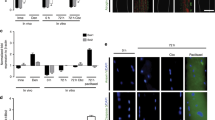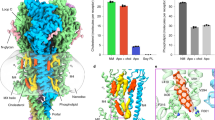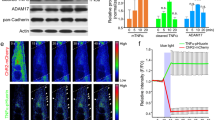Abstract
A glycoprotein purified from chick brain, of relative molecular mass 42,000, increases the rate of appearance of acetylcholine receptors (AChRs) on the surface of chick myotubes1. RNase protection assays have shown that this AChR-inducing activity (ARIA) increases the amount of mRNA encoding the α-subunit of the AChR, with little or no effect on the amounts of γ- and δ-mRNAs2. Here, we report that the mRNAs encoding the α- and γ-subunits of the receptor detected by in situ hybridization are concentrated around nuclei in cultured myotubes. Consistent with previous results, ARIA selectively increased the amount of α-subunit mRNA, but we now find that all nuclei were not activated to the same extent, with a substantial number not responding at all. Assuming that ARIA is released by motor nerve terminals, our results indicate that only a subset of muscle nuclei are capable of contributing to the accumulation of AChRs at developing neuromuscular junctions.
This is a preview of subscription content, access via your institution
Access options
Subscribe to this journal
Receive 51 print issues and online access
$199.00 per year
only $3.90 per issue
Buy this article
- Purchase on Springer Link
- Instant access to full article PDF
Prices may be subject to local taxes which are calculated during checkout
Similar content being viewed by others
References
Usdin, T. B. & Fischbach, G. D. J. Cell Biol. 103, 493–507 (1986).
Harris, D. A., Falls, D. L., Dill-Devor, R. M. & Fischbach, G. D. Proc. natn. Acad. Sci. U.S.A. 85, 1983–1987 (1988).
Merlie, J. P. & Smith, M. M. J. Membrane Biol. 91, 1–10 (1986).
Dubinsky, J. M., Morgan, M. & Fischbach, G. D. Devl Biol. 130, 209–219 (1988).
Fischbach, G. D. & Cohen, S. A. Devl Biol. 31, 147–162 (1973).
Burner, J. M. & Bursztajn, S. Devl Biol. 115, 35–43 (1986).
Englander, L. L. & Rubin, L. L. J. Cell Biol. 104, 87–95 (1987).
Fontaine, B., Sassoon, D., Buckingham, M. & Changeux, J.-P. EMBO J. 7, 603–609 (1988).
Merlie, J. P. & Sanes, J. R. Nature 317, 66–68 (1985).
Buc-Caron, M.-H., Nystrom, P. & Fischbach, G. D. Devl Biol. 95, 378–386 (1983).
Hayward, L. J. & Schwartz, R. J. J. Cell. Biol. 102, 1485–1493 (1986).
Eldridge, J., Zehner, Z. & Paterson, B. M. Gene 36, 55–63 (1985).
Nef, P., Oncyser, C., Alliod, C., Couturier, S. & Ballivet, M. EMBO J. 7, 595–601 (1988).
Author information
Authors and Affiliations
Rights and permissions
About this article
Cite this article
Harris, D., Falls, D. & Fischbach, G. Differential activation of myotube nuclei following exposure to an acetylcholine receptor-inducing factor. Nature 337, 173–176 (1989). https://doi.org/10.1038/337173a0
Received:
Accepted:
Issue Date:
DOI: https://doi.org/10.1038/337173a0
This article is cited by
-
Evidence that CGRP and cAMP increase transcription of AChR α-subunit gene, but not of other subunit genes
Journal of Molecular Neuroscience (1991)
-
Interactions between intrinsic regulation and neural modulation of acetylcholinesterase in fast and slow skeletal muscles
Cellular and Molecular Neurobiology (1991)
-
Imprinting of acetylcholine receptor messenger RNA accumulation in mammalian neuromuscular synapses
Nature (1990)
-
High endocytotic and lysosomal activities in segments of rat myotubes differentiated in vitro
Cell and Tissue Research (1990)
-
In situ hybridization of slow myosin heavy chain mRNA in normal and transforming rabbit muscles with the use of a nonradioactively labeled cRNA
Histochemistry (1990)
Comments
By submitting a comment you agree to abide by our Terms and Community Guidelines. If you find something abusive or that does not comply with our terms or guidelines please flag it as inappropriate.



